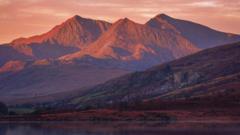
Wales’ Highest Mountain and National Park Embrace Traditional Welsh Names
The national park authority has officially adopted the Welsh names Yr Wyddfa and Eryri, replacing the English names Snowdon and Snowdonia, in a move that highlights the importance of preserving Welsh language and cultural heritage.
In November 2022, the park authority voted to use these traditional Welsh names in all official communications, following a petition signed by 5,000 people. The change aims to encourage global engagement with Welsh language and culture, not to create division.
Many Welsh speakers emphasize that these are not new names, but the names they have always used. Tudur Owen, a writer and broadcaster, explained that terms like Snowdon and Snowdonia feel alien to local residents. He views the change as a simple “brand update” similar to what companies frequently do.
A survey conducted by the park authority revealed that 65% of visitors viewed the name change positively, with only 10-15% expressing opposition. Some concerns have been raised about potential visitor confusion, but supporters argue that the change promotes cultural understanding.
The pronunciation of the new official names is:
– Yr Wyddfa: “Uhr With-Va”
– Eryri: “Eh Ruh-Ree”
Local perspectives on the change vary. Tony Evans, a visitor from Milton Keynes, said the name change doesn’t affect his enjoyment of the mountain. Mohiuddin Kamal from Denbighshire strongly supports the move, believing it helps protect Welsh heritage.
Owen argues that the name change is about offering an informed choice and promoting bilingualism. “Wales can be a truly bilingual country where English and Welsh co-exist and intermingle,” he stated. He emphasizes that people can still use Snowdon and Snowdonia, but Yr Wyddfa and Eryri are now the official names.
Contrary to concerns about potential negative impacts, Owen points out that local businesses are already embracing the Welsh names. He notes that tourism seems unaffected, with continued high visitor numbers and bustling facilities at the mountain’s summit.
The change is more than just a linguistic shift; it represents a deeper connection to cultural roots. Owen explains that using Welsh place names links people to over 2,000 years of history and challenges misconceptions about language and nationalism.
The park authority’s decision reflects a broader movement to recognize and celebrate Welsh linguistic heritage. By prioritizing the traditional Welsh names, they are helping to preserve and promote the language for future generations.
Visitors and locals alike are encouraged to learn and use the Welsh names, seeing them not as a barrier but as an opportunity to engage with a rich and vibrant cultural tradition.








